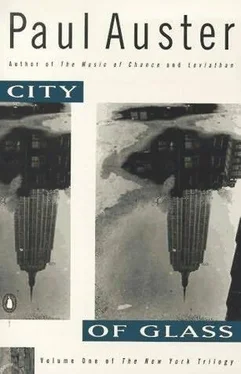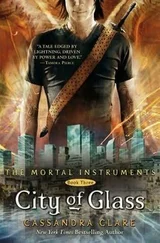Paul Auster - City of Glass
Здесь есть возможность читать онлайн «Paul Auster - City of Glass» весь текст электронной книги совершенно бесплатно (целиком полную версию без сокращений). В некоторых случаях можно слушать аудио, скачать через торрент в формате fb2 и присутствует краткое содержание. Жанр: Современная проза, на английском языке. Описание произведения, (предисловие) а так же отзывы посетителей доступны на портале библиотеки ЛибКат.
- Название:City of Glass
- Автор:
- Жанр:
- Год:неизвестен
- ISBN:нет данных
- Рейтинг книги:5 / 5. Голосов: 1
-
Избранное:Добавить в избранное
- Отзывы:
-
Ваша оценка:
- 100
- 1
- 2
- 3
- 4
- 5
City of Glass: краткое содержание, описание и аннотация
Предлагаем к чтению аннотацию, описание, краткое содержание или предисловие (зависит от того, что написал сам автор книги «City of Glass»). Если вы не нашли необходимую информацию о книге — напишите в комментариях, мы постараемся отыскать её.
City of Glass — читать онлайн бесплатно полную книгу (весь текст) целиком
Ниже представлен текст книги, разбитый по страницам. Система сохранения места последней прочитанной страницы, позволяет с удобством читать онлайн бесплатно книгу «City of Glass», без необходимости каждый раз заново искать на чём Вы остановились. Поставьте закладку, и сможете в любой момент перейти на страницу, на которой закончили чтение.
Интервал:
Закладка:
"An admirable response."
"The only response. The only one worthy of a man of my stature. You see, I am in the process of inventing a new language. With work such as that to do, I can't be bothered by the stupidity of others. In any case, it's all part of the disease I'm trying to cure. "
"A new language?"
"Yes. A language that will at last say what we have to say. For our words no longer correspond to the world. When things were whole, we felt confident that our words could express them. But little by little these things have broken apart, shattered, collapsed into chaos. And yet our words have remained the same. They have not adapted themselves to the new reality. Hence, every time we try to speak of what we see, we speak falsely, distorting the very thing we are trying to represent. It's made a mess of everything. But words, as you yourself understand, are capable of change. The problem is how to demonstrate this. That is why I now work with the simplest means possible-so simple that even a child can grasp what I am saying. Consider a word that refers to a thing-'umbrella,' for example. When I say the word 'umbrella,' you see the object in your mind. You see a kind of stick, with collapsible metal spokes on top that form an armature for a waterproof material which, when opened, will protect you from the rain. This last detail is important. Not only is an umbrella a thing, it is a thing that performs a function-in other words, expresses the will of man. When you stop to think of it, every object is similar to the umbrella, in that it serves a function. A pencil is for writing, a shoe is for wearing, a car is for driving. Now, my question is this. What happens when a thing no longer performs its function? Is it still the thing, or has it become something else? When you rip the cloth off the umbrella, is the umbrella still an umbrella? You open the spokes, put them over your head, walk out into the rain, and you get drenched. Is it possible to go on calling this object an umbrella? In general, people do. At the very limit, they will say the umbrella is broken. To me this is a serious error, the source of all our troubles. Because it can no longer perform its function, the umbrella has ceased to be an umbrella. It might resemble an umbrella, it might once have been an umbrella, but now it has changed into something else. The word, however, has remained the same. Therefore, it can no longer express the thing. It is imprecise; it is false; it hides the thing it is supposed to reveal. And if we cannot even name a common, everyday object that we hold in our hands, how can we expect to speak of the things that truly concern us? Unless we can begin to embody the notion of change in the words we use, we will continue to be lost."
"And your work?"
"My work is very simple. I have come to New York because it is the most forlorn of places, the most abject. The brokenness is everywhere, the disarray is universal. You have only to open your eyes to see it. The broken people, the broken things, the broken thoughts. The whole city is a junk heap. It suits my purpose admirably. I find the streets an endless source of material, an inexhaustible storehouse of shattered things. Each day I go out with my bag and collect objects that seem worthy of investigation. My samples now number in the hundreds-from the chipped to the smashed, from the dented to the squashed, from the pulverized to the putrid."
"What do you do with these things?"
"I give them names."
"Names?"
"I invent new words that will correspond to the things."
"Ah. Now I see. But how do you decide? How do you know if you've found the right word?"
"I never make a mistake. It's a function of my genius."
"Could you give me an example?"
"Of one of my words?"
"Yes.”
"I’m sorry, but that won't be possible. It's my secret, you understand. Once I've published my book, you and the rest of the world will know. But for now I have to keep it to myself."
"Classified information."
"That's right. Top secret.
“I’m sorry.”
"You shouldn't be too disappointed. It won't be long now before I've put my findings in order. Then great things will begin to happen. It will be the most important event in the history of mankind.
The second meeting took place a little past nine o'clock the following morning. It was Sunday, and Stillman had emerged from the hotel an hour later than usual. He walked the two blocks to his customary breakfast place, the Mayflower Cafe, and sat down in a corner booth at the back. Quinn, growing bolder now, followed the old man into the restaurant and sat down in the same booth, directly opposite him. For a minute or two Stillman seemed not to notice his presence. Then, looking up from his menu, he studied Quinn's face in an abstract sort of way. He apparently did not recognize him from the day before.
"Do I know you?" he asked.
"I don't think so," said Quinn. "My name is Henry Dark."
"Ah," Stillman nodded. "A man who begins with the essential. I like that."
"I’m not one to beat around the bush," said Quinn.
"The bush? What bush might that be?"
"The burning bush, of course."
"Ah, yes. The burning bush. Of course." Stillman looked Quinn's face-a little more carefully now, but also with what seemed to be a certain confusion. "I'm sorry," he went on, "but don't remember your name. I recall that you gave it to me no long ago, but now it seems to be gone."
"Henry Dark," said Quinn.
"So it is. Yes, now it comes, back to me. Henry Dark." Stillman paused for a long moment and then shook his head. "Unfortunately, that's not possible, sir."
"Why not?"
"Because there is no Henry Dark."
"Well, perhaps I'm another Henry Dark. As opposed to the one who doesn't exist."
"Hmmm. Yes, I see your point. It is true that two people sometimes have the same name. It's quite possible that your name is Henry Dark. But you're not the Henry Dark."
"Is he a friend of yours?"
Stillman laughed, as if at a good joke. “Not exactly," he said. "You see, there never was any such person as Henry Dark. I made him up. He's an invention."
"No," said Quinn, with feigned disbelief.
"Yes. He's a character in a book I once wrote. A figment."
"I find that hard to accept."
“So did everyone else. I fooled them all."
"Amazing. Why in the world did you do it?"
"I needed him, you see. I had certain ideas at the time that were too dangerous and controversial. So I pretended they had come from someone else. It was a way of protecting myself"
"How did you decide on the name Henry Dark?"
"It's a good name, don't you think? I like it very much. Full of mystery, and at the same time quite proper. It suited my purpose well. And besides, it had a secret meaning."
"The allusion to darkness?"
"No, no. Nothing so obvious. It was the initials, H.D. That was very important."
"How so?"
"Don't you want to guess?"
"I don't think so."
"Oh, do try. Make three guesses. If you don't get it, then I'll tell you."
Quinn paused for a moment, trying to give it his best effort. “H.D.," he said. "For Henry David? As in Henry David Thoreau."
"Not even close."
"How about H. D. pure and simple? For the poet Hilda Doolittle.
"Worse than the first one."
"All right, one more guess. H. D. H… and D… Just a moment… How about… Just a moment… Ah… Yes, here we are. H for the weeping philosopher, Heraclitus… and D for the laughing philosopher, Democritus. Heraclitus and Democritus… the two poles of the dialectic."
"A very clever answer."
"Am I right?"
"No, of course not. But a clever answer just the same."
"You can't say I didn't try."
"No, I can't. That’s why I'm going to reward you with the correct answer. Because you tried. Are you ready?"
Читать дальшеИнтервал:
Закладка:
Похожие книги на «City of Glass»
Представляем Вашему вниманию похожие книги на «City of Glass» списком для выбора. Мы отобрали схожую по названию и смыслу литературу в надежде предоставить читателям больше вариантов отыскать новые, интересные, ещё непрочитанные произведения.
Обсуждение, отзывы о книге «City of Glass» и просто собственные мнения читателей. Оставьте ваши комментарии, напишите, что Вы думаете о произведении, его смысле или главных героях. Укажите что конкретно понравилось, а что нет, и почему Вы так считаете.












